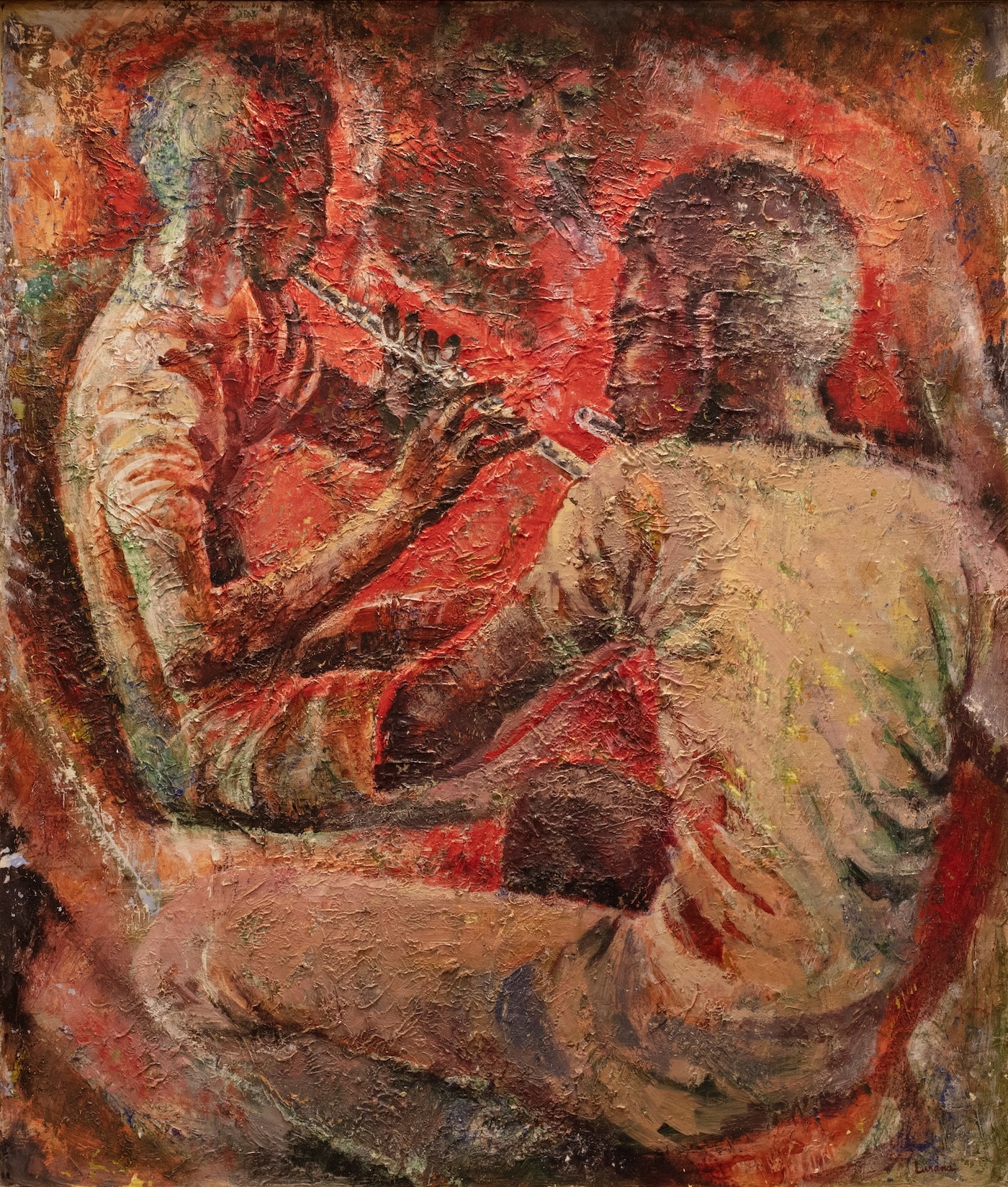Ogden Museum of Southern Art
925 Camp St
New Orleans, LA 70130
504.539.9600 | HOURS
925 Camp St
New Orleans, LA 70130
504.539.9600 | HOURS

Sister Mary Lurana Neely, S.B.S., Untitled (Flute Players), c. 1965, Acrylic on board, 29 x 26 inches, Courtesy of Xavier University of Louisiana Art Collection
The year 2025 marks 100 years since the founding of Xavier University of Louisiana (XULA). Founded by Saint Katharine Drexel and the Sisters of the Blessed Sacrament, XULA is the nation’s only historically Black and Catholic University. The core Mission of the University is to serve the underrepresented Black population and to “contribute to the promotion of a more just and humane society by preparing its students to assume roles of leadership and service in a global society.” Over the past century, Xavier has fulfilled that mission time and time again, producing leaders and visionaries of American life. From its earliest years, Xavier has had a strong art department to support and fulfill that mission – one that has employed and continues to produce some of the South’s finest visual artists. On its centennial anniversary, this exhibition celebrates that accomplishment.
Established in 1935 by Ferdinand Rousseve, Ph.D., the Department of Fine Arts (Now the Department of Art and Performance Studies) at Xavier University of Louisiana has a unique and vital history. Ferdinand’s brother, Numa Rousseve, was deeply involved in the department’s initial formative years. Along with Sister Lurana Neely, he cultivated a set of principles in Xavier art students that the college still promotes today. Among these principles are a spirit of cooperative learning and a commitment to community-based arts projects. These principles were kept alive by John T. Scott in his role as head of the art department and cultivator of the university art collection for 40 years.
This exhibition draws its title from an often-repeated phrase from John T. Scott. Scott guided his students with the mantra “Each one teach one,” instilling a practice of giving and mentorship alongside developing artistic skills. John T. Scott was a sculptor, painter, printmaker, collagist and MacArthur Fellow. He was both a graduate of Xavier and a professor, beginning his teaching career there in 1965. After his death in 2007, former Xavier President Norman C. Francis recalled, “He had a very famous admonition that all of us remember. He didn’t want thanks. Just pass it on. Pass it on to others.” His legacy of excellence in his practice and of giving back to the community was transformational in Xavier’s Fine Art Department and the lives and work of his students. That legacy continued under the stewardship of Ron Bechet, former department head and co-curator of this exhibition. Each One Teach One is a celebration and illustration of those founding and cultivated principles of excellence and community that define Xavier University of Louisiana and their enduring legacy.
support each one teach oneMother Katharine Drexel was a Philadelphia heiress who devoted her life to educating Native Americans and African Americans. She followed her calling at Pope Leo XIII’s suggestion to find the Sisters of the Blessed Sacrament. In 1915, they established a high school on the former site of Southern University, which had recently moved to Baton Rouge from Uptown New Orleans due to racist opposition to an HBCU being in their neighborhood. Drexel purchased the land quietly with her own money and opened Xavier University Preparatory School. As the school expanded, moving to its current location in Gert Town, the high school remained. It is now Saint Katharine Drexel Preparatory School. A decade after the school’s founding, Xavier University of Louisiana (XULA) was born with through the establishment of the College of Liberal Arts and Sciences.
In its 100-year history, Xavier University of Louisiana has faced adversities almost Biblical in scope. Hurricanes. Floods. Cultural Revolution. Global pandemic. State and local governments that fought against its very existence. XULA, the nation’s only Catholic and historically Black University, was founded by a white nun who was determined to admit students of all faiths and races—and to do so in the same city where Plessy v. Ferguson had prompted decades of enforced segregation throughout the South. That nun, Mother Katharine Drexel, has since been canonized a Saint.
Host Committee
Wayne Amèdée
Rosemary G. Ryan
Penny and Kendal Weaver
Terese and William Winslow